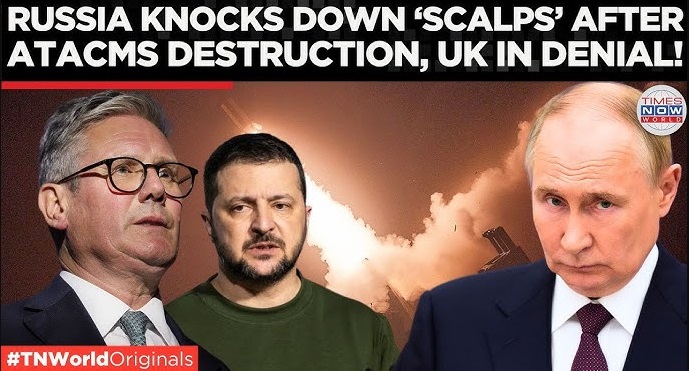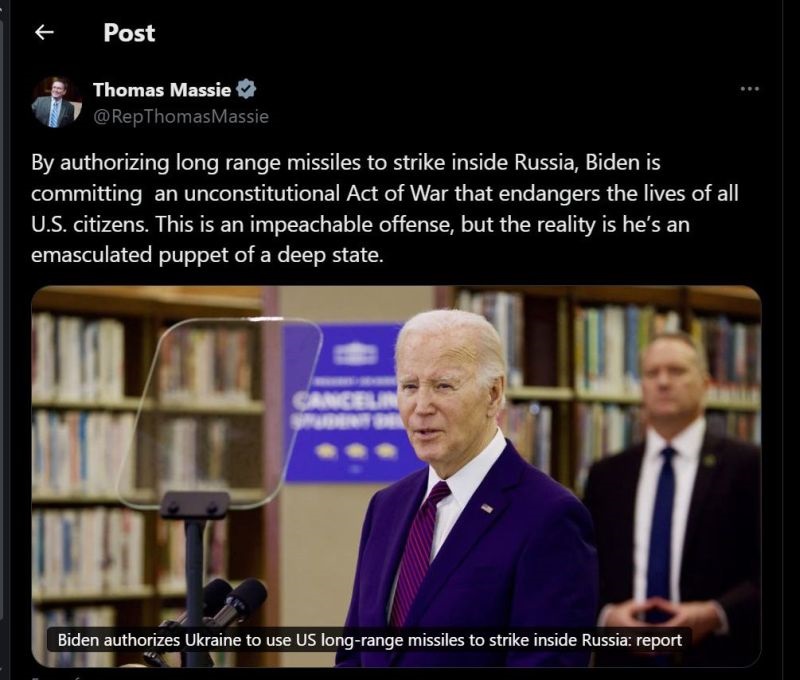
Kyiv now using British Storm Shadow missiles to attack Russia. This 'Trump proofing' is massively short-sighted, stresses at ‘The Responsible Statecraft’ Anatol Lieven, a Director of the Eurasia Program at the Quincy Institute.
The UK has apparently given the greenlight for Kyiv to use its Storm Shadow missiles for attacking inside Russia. While the British government has not commented publicly, the Ukrainian military used the missiles to strike Russia for the first time on Wednesday.
In keeping with most British military “decisions,” its actions Wednesday followed the Biden Administration’s approval to allow Ukraine to use its own long-range ATACMS in the same way.
The British government seems to have forgotten that two months from now, the Biden administration will no longer be in office and the Trump White House may not take kindly to what some of its future members see as British support for a preemptive Biden attempt to wreck Trump’s peace agenda in Ukraine.
From the point of view of Britain’s own security interests (which do not appear to play any part in British establishment thinking about Ukraine), British citizens just have to hope that after January the Russian government does not retaliate against the UK — for if it does, they may not receive much sympathy from Washington.
The official argument for the ATACMS and Storms Shadows decision is to put Ukraine in a stronger position before peace talks are initiated by Trump.
This is a dangerous gamble, because the missiles (which are guided to their targets by U.S. personnel) risk infuriating Russia without giving really critical help to Ukraine. It is especially dangerous for the UK, because if Putin feels impelled to live up to its promises to retaliate without attacking U.S. interests and alienating Trump, he could well feel that the UK makes a safer target — it is at least a gamble based on rational calculations.
This is not exactly what the government and the British security establishment have been saying. Like some East European governments, and influential political voices in Western Europe, the British government is still talking of helping Ukraine “win” — not to achieve a better compromise.
Like the Biden administration, British and NATO language of the “irreversibility” of Ukrainian NATO membership, and the necessity of Russia leaving the Ukrainian territory it has occupied suggest opposition to any conceivable peace settlement that Trump could seek to achieve. If the UK is seen by Trump to be deliberately sabotaging his peace agenda, this will be hugely damaging to the American-British relationship, and put Britain in an extremely exposed position.
Such an interpretation by Trump is likely to be encouraged by the talk in Washington, London and European capitals about “Trump-proofing” aid to Ukraine, and suggestions by European analysts that Europe both should and can support Ukraine in continuing to fight even if the Trump administration withdraws U.S. support.
As to Europe replacing the U.S. in terms of military support for Ukraine, this looks absurd. In critical areas like air defense systems, European military industries are not remotely capable even of providing for their own countries’ defense, let alone of providing what Ukraine needs.
Earlier this year, European governments rebuffed Ukraine’s appeal for more air defense weapons. These shortages extend across the board. Almost unbelievably, the British government’s decision on Storm Shadows occurred simultaneously with an announcement of further deep cuts to the UK armed forces, including its last amphibious assault ships and a large proportion of its transport helicopters.
The utterly confused state of British and European thinking about the military realities of the Ukraine conflict and Europe’s role is in large part due to the pitiful ignorance of military matters on the part of politicians — and therefore governments — who with the rarest of exceptions have never served in the military themselves, or bothered to study military issues, or devoted serious study to any foreign country.
This makes them completely dependent on advice from their foreign and security establishments; and for decades now, these establishments have outsourced to Washington not just responsibility for their national security, but thinking about it.
If you ask most members of European think tanks to define the specifically British, or French, or Danish interests in the Ukraine War, they are not merely incapable of answering, they clearly regard the very question as somehow illegitimate and disloyal to the U.S.-mandated “rules-based order.”
But the America to which these Europeans are loyal is the old U.S. foreign and security establishment — not the America of Trump, which they do not understand and deeply hate and fear (just as they do their own populist oppositions). Indeed, until a very few months ago the great majority of European politicians and experts simply refused to believe that Trump could possibly win the elections.
Many have now lost their heads entirely, and are just running around in circles. Others, like the Poles and Balts, have their heads firmly screwed on, but back to front.
As to the British government and security establishment, since the U.S. elections they have resembled their predecessor King Charles I, who according to legend went on talking for half an hour after his head had been cut off. Perhaps given time they can grow a new head of their very own. But in the meantime, for people in this embarrassing position, a period of silent inaction would seem to be the wise course to adopt, Anatol Lieven notes.

For the United Kingdom and other western allies of Ukraine, it is important to avoid overreacting to this development, writes ‘The Spectator’.
This week, Russia launched a missile attack on Dnipro, Ukraine, reportedly using a new medium-range ballistic missile named ‘Oreshnik’, as confirmed by President Putin.
Putin stated that the missile attack was a response to Ukraine’s use of western-built missile systems inside Russia, including US-supplied ATACMS ballistic missiles and British Storm Shadow cruise missiles.
Before this confirmation, speculation arose that Russia might have launched an intercontinental-range ballistic missile. This claim was initially reported by President Zelensky the morning after the attack, who noted that the missile’s flight path characteristics matched those of an intercontinental-range ballistic missile.
While Putin unveiled the Oreshnik as a novel addition to Russia’s arsenal, it is likely a derivative of an existing design.
This speculation was further fuelled by video imagery of the attack indicating that the missile carried a MIRVed payload. MIRV, or ‘multiple independently targetable re-entry vehicles’, allows a single missile to carry multiple warheads, each capable of striking different targets independently. This significantly increases a missile’s destructive potential and complicates missile defence efforts.
Before this week, MIRV technology had been exclusively limited to Russian intermediate- and intercontinental-range ballistic missiles. Now it has been confirmed that Russia has added MIRV technology to the Oreshnik medium-range ballistic missile. Video imagery of the Russian attack suggests it involved at least one MIRVed missile, carrying what appears to be six warheads that descended onto their targets in quick succession.
Russia was likely aware that the attack might fail to achieve its military objectives but proceeded nonetheless to send a political message. In fact, the nuclear threat implied by the missile strike – due to the association of MIRV technology with nuclear weapons – was likely the primary reason behind the decision. As a result, the West – including the United Kingdom, Germany, and the United States – was as much a target of the strike as Ukraine, aiming to discourage the expansion and continuation of military aid to Ukraine.
Another possible reason for the attack was to demonstrate that Russia retains the capability to inflict destruction in Ukraine at will, despite Ukraine’s growing arsenal of western missile defence systems.
For the United Kingdom and other western allies of Ukraine, it is important to avoid overreacting to this development.
While Russia’s signalling should not be dismissed, we can take reassurance in the fact that there remains a considerable gap between the launch of this type of missile and the use of a nuclear warhead, particularly one aimed at a NATO country.
read more in our Telegram-channel https://t.me/The_International_Affairs

 10:00 24.11.2024 •
10:00 24.11.2024 •






















